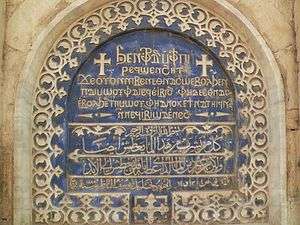Bashmurian revolt
| Bashmurian revolt | |||||||
|---|---|---|---|---|---|---|---|
| |||||||
| Belligerents | |||||||
|
Umayyad Caliphate |
| ||||||
| Commanders and leaders | |||||||
|
Hawthara ibn Suhayl | |||||||

Bashmurian revolt (Egyptian Arabic: ثورة البشموريين) (also Peshmurian revolt) was the revolt of the Coptic Christians living in Bashmur in the northern Nile Delta against the Abbasids, which occurred around 830. The revolt (and others previous) were attributed to oppressive taxation.[1]
The rebels expelled the state workers and raised the banner of rebellion refusing to pay tribute (special tax on non-Muslims called the jizya). Caliph Al-Ma'mun, who was visiting the province, put down the rebellion, arresting and killing large numbers of Copts and their dependants. According to historian Ira M. Lapidus, the crushing of the rebellion was followed by "despair" among the Copts and began a second wave of major persecution, which hadn't been seen since the entry of Islam to Egypt in 642.[2][3]
References
- ↑ Goddard, Hugh (2000). A History of Christian-Muslim Relations. Rowman & Littlefield. p. 71. ISBN 1566633400. Retrieved 20 January 2016.
Large-scale conversion to Islam in Egypt began during the eighth/second century and was very much linked with economic hardship. Oppressive taxation led to a whole series of revolts in different regions of Egypt between 725/107 and 832/217, and these were crushed by the local governors and in the end, the caliph al-Ma'mun himself who visited the province in 832/217.
- ↑ Goddard, Hugh (2000). A History of Christian-Muslim Relations. Rowman & Littlefield. p. 71. ISBN 1566633400. Retrieved 20 January 2016.
- ↑ I.M. Lapidus, "The Conversion of Egypt to Islam" in Israel Oriental Studies, 2 (1972), p.257
Bibliography
- Muhammad ibn Iyas, Bada'I al-Zuhur fi Waqa'I al-Duhur.
- Aziz Suryal Atiya, The Coptic Encyclopedia.
- Al-Maqrizi, Historia Regum Islamiticorum in Abyssinia (ed. and Latin trans. F. T. Rink, Leiden, 1790).
- Severus Ibn al-Muqaffaʿ, History of the Patriarchs of Alexandria.
| Look up Copt in Wiktionary, the free dictionary. |
